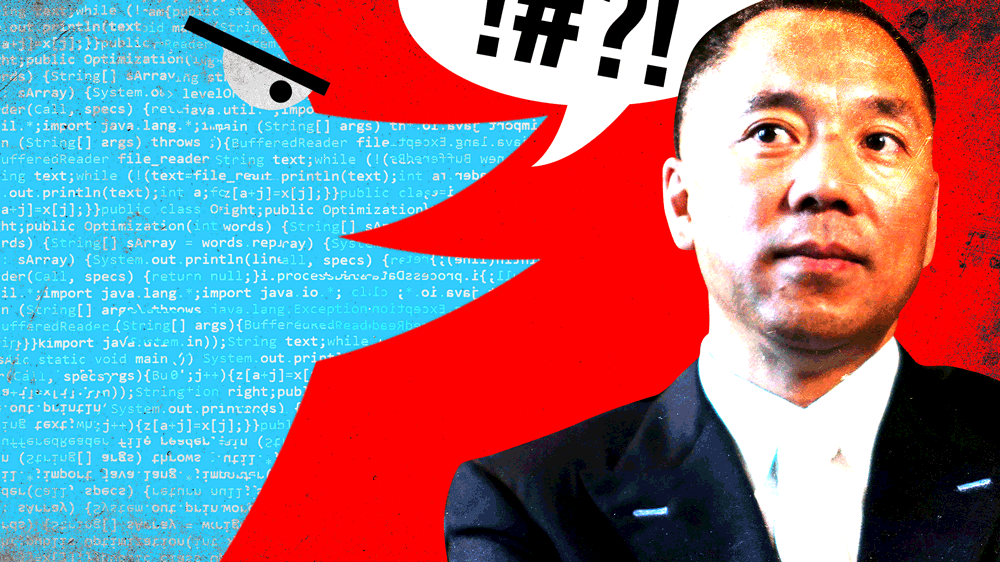This week, a wave of disgruntled Twitter users spoke out with a set of very specific messages: Guo Wengui, a Chinese dissident at the center of a diplomatic incident featuring Donald Trump and the American and Chinese governments, is apparently a liar, deceptive, and can’t be trusted.
A Daily Beast analysis, however, shows that many of these users are working in tandem and likely automated. The pervasiveness of the apparent troll accounts illustrates how easy it is to still target users with harassment and push rhetoric, even as Twitter once again publicly doubled down on harassment on its service earlier this month.
On Sunday, The Wall Street Journal reported that President Trump called for the deportation of Guo, a Chinese exile living in New York, after receiving a hand-delivered request from a casino owner with business interests in China.
Trump reportedly decided to stop calling for deportation when he found out Guo was a Mar-a-Lago member.
Guo has repeatedly accused the Chinese government of high-level corruption, and Chinese security officials visited him in his New York apartment in May, the report continues.
This subsequently set off a chain of perilous diplomatic events, with the FBI considering arresting the Chinese officials, who had illegally entered the country on false pretenses.
Meanwhile, distributed denial-of-service (DDoS) attacks—where a website or other target is flooded with so much traffic it crawls to halt—struck against organizations affiliated with Guo in the past month.
“This is a crazy story on many levels,” BuzzFeed world editor Miriam Elder tweeted on Monday, along with a link to The Wall Street Journal’s article.
Quickly, a string of Twitter users responded, attacking the story and its subjects.
“Guo is a liar. Guo previously said he didn’t have a recording, which was released by the FBI from the detained liu yanping phone,” several accounts identically tweeted, referring to Liu Yanping, one of the Chinese officials who was set to meet with Guo in the U.S.
Many of the sentences were tweeted by several different bot accounts at the very same second.
Twitter initially marked the accounts as “temporarily restricted,” meaning Twitter displays a warning of “unusual activity from this account” after clicking on the user’s profile.
After The Daily Beast brought the accounts to Twitter’s attention, the social network suspended a number of the accounts, but many other suspicious accounts remained active as of Thursday.
As usual, Twitter would not speak on the record about the issue, and instead a spokesperson said “we do not comment on individual accounts, for privacy and security reasons.”
The company has given the same exact comment to The Daily Beast regarding any story about bot accounts and international influence campaigns in the past year.
Elsewhere on Twitter, and not specifically in response to The Wall Street Journal article, other accounts posted similar messages, including: “Mr Guo is cannot be trusted, he record the conversations with everyone even US official.”
Several accounts tweeted a sentence that might be considered a threat—if only the poorly translated post were comprehensible. “Can only let Guo Wengui poisonous thirst will eventually died of death!” the oft-tweeted phrase reads.
A number of accounts also tweeted that Guo’s “performance is amazing, enough to get Oscar emperor.” The first mention of that specific phrase seems to date back to Oct. 8.
And a series of accounts created just this month repeatedly tweeted identical Chinese-language messages on Wednesday and Thursday, saying that the Guo story was “a smear scandal.”
None of these tweets specifically mentioned Guo’s own Twitter account, where he has published some of his allegations. But they still show how Twitter users, or trolls, can try to besmirch a particular target, even though the accounts are clearly coordinated and suspicious.
Twitter’s commitment to releasing public statements promising more transparency and the end of harassment on the social network has only been matched by repeated public failures to do anything to the now decade-long issues plaguing the service.
Two weeks ago, Twitter CEO Jack Dorsey tweeted that, “We need to be a lot more transparent in our actions in order to build trust.”
But two hours after the transparency pledge, when The Daily Beast asked for clarification about why an account that repeatedly targeted a pizza shop with fictitious pedophilia accusations was later given a “verified” status on the service, the company responded with a “no comment.”
As BuzzFeed’s Charlie Warzel pointed out, the service has been promising more “transparency” and better rules implementation for over nine years, often using the same language to do so.
In the interim, coordinated harassment, trending topics gamed by bot networks, and covert influence campaigns from dictatorial governments have used the service as a primary hub to interfere in elections across the globe in the past year.
It’s not clear who was behind these anti-Guo accounts, or if the individuals who fancied making their voice heard in a bizarre, coordinated manner were linked to the Chinese government.
According to a 2016 study, Chinese pro-government internet trolls pump out around 488 million social media posts annually, to “regularly distract the public and change the subject.”






